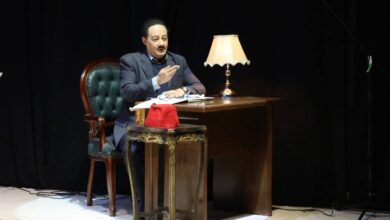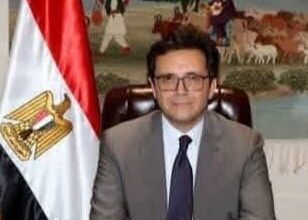ثمرة جهود الهيئة العربية للمسرح في القرن الأفريقي..”وادي الذئاب” تعيد للمسرح الصومالي حياته بعد ثلاثة عقود من التوقف
في خدمة المسرح في منطقة القرن الأفريقي،

المسرح نيوز ـ القاهرة| أخبار
ـ
إعلام الهيئة العربية للمسرح
صرح الأمين العام للهيئة العربية للمسرح اسماعيل عبد الله بقوله: إن الهيئة التي تعمل على تنفيذ خلاق لرؤى صاحب السمو الشيخ الدكتور سلطان بن محمد القاسمي، والتي تهدف إلى تنمية المسرح في كل بقعة من الوطن العربي، تنظر بعين الاعتزاز أن ثمرة جهودها في خدمة المسرح في منطقة القرن الأفريقي،
والتي توجت بتنظيم دورة تدريبية لصالح اثنين وعشرين متدربا ومتدربة من جيبوتي والصومال قد بدأت بالتبلور، فقد التحقت متدربتان من جيبوتي بالمعهد العالي للفن المسرحي والتنشيط الثقافي في الرباط، وهما أول من يلتحق للتخصص بالمسرح من جيبوتي،
وكذلك فإن المسرح الصومالي سيشهد أول تحرك بعد سبات دام أكثر من ثلاثين عاماً على توقف الإنتاج المسرحي في الصومال، نتيجة الظروف السياسية التي عاشتها، حيث تعود الحياة لتدب في أوصال المسرح الوطني في مقديشو؛ من خلال إنتاج للمسرح الوطني يحمل عنوان وادي الذئاب.
الشاعر عبد الرحمن محمد الفيلي الذي قرر أن يخوض مغامرة كتابة وإخراج مسرحية (وادي الذئاب) أفادنا بالتصريح التالي:
الشرارة انطلقت من الدورة التدريبية المسرحية التي نظمتها الهيئة العربية للمسرح في “جيبوتي” العام الماضي، لتدريب فريقين من الصومال وجيبوتي،
والتي جاءت بعد توقيع اتفاق ثلاثي بين الهيئة والوكالة الوطنية في جيبوتي والمسرح الوطني في مقديشو، وكنت أحد الإداريين الذين أشرفوا على إنجاز تلك الاتفاقية، وحين جاء موعد الدورة قررت أن أكون من بين المتدربين في الدورة، وتلقينا تدريبات ومحاضرات هامة جداً على يد المخرج أمين ناسور، والسينوغرافي طارق الربح وكلاهما من المغرب، وقد اختارتهما الهيئة لتنفيذ الدورة بإشراف من مدير التدريب فيها الفنان غنام غنام.
وتابع عبد الرحمن الفيلي: عدنا من جيبوتي محملين بحلم إعادة إحياء المسرح الصومالي الذي كان له شأن كبير في ثمانينيات القرن الماضي، وأردنا أن نطبق تلك المهارات والمعارف التي اكتسبناها في الدورة، وقررت أن أكون أنا من يعلق الجرس، وشجعني على الأمر مدير المسرح الوطني في مقديشو الشاعر عثمان غوري، فكتبت مسرحية “وادي الذئاب” وبدأت التدريب مع مجموعة من العاملين في المسرح الوطني الذين تلقوا التدريب في تلك الدورة وهم (أحمد ريس، عبد الناصر سيرو، عبد القادر ليكسلي، ومحمد دلاب) وكذلك الممثلة (صفية محمد).
وأضاف الفيلي: إنني واثق من أن هذه المسرحية ستساهم في إحياء صناعة المسرح وإنتاجه في الصومال. لأن الصومال لم يكن لديه مسرح فعال خلال العقود الثلاثة الماضية، مما أعاق نمو وتطور وإنتاج صناعة السينما والمسرح في الصومال. آمل أن يلهم إنتاج هذه المسرحية المزيد من الصوماليين لإعادة الثقافة والفنون الغنية للصومال إلى موقعها في صناعة مستقبل الشعب الصومالي ذي التراث الثقافي العريق.
The wolf valley brings back the Somali theatre after three decades of stopping.
Source: Arab Theatre Institute media.
The Secretary-General of the Arab Theater Institute, Ismail Abdullah, stated: The A.T.I which works to creatively implement the visions of His Highness Sheikh Dr. Sultan bin Muhammad Al Qasimi, which aims to develop theater in every part of the Arab world, views with pride the fruit of its efforts in serving theater in The Horn of Africa region, which culminated in the organization of a training course for twenty-two male and female trainees from Djibouti and Somalia, has begun to take shape. Two trainees from Djibouti have joined the Higher Institute of Theatrical Art and Cultural Revitalization in Rabat, and they are the first to enroll in theater from Djibouti. Likewise, theater for Somalia will witness its first movement after a slumber that lasted more than thirty years since the cessation of theatrical production in Somalia, because of the political circumstances it experienced, as life returns to the National Theater in Mogadishu. Through a production by the National Theater entitled Valley of the Wolves.
The poet Abdul Rahman Muhammad Al-Fili, who decided to embark on the adventure of writing and directing the play (Valley of the Wolves), provided us with the following statement:
We launched the theatrical training course organized by the Arab Theatre Authority in Djibouti last year to train two teams from Somalia and Djibouti, which followed the signing of a tripartite agreement between the Authority and the National Agency of Djibouti and the National Theatre of Mogadishu, and I was one of the administrators who supervised the completion of that agreement. When the course came, I decided to be one of the trainees at the course, and we received very important training and lectures by the director of the fistula, scenographer Tariq, both of whom were from Morocco.
Abd al-Rakhman al-Fili continues we returned from Djibouti with the dream of reviving the Somali theatre, which was of great importance in the 1980s, and we wanted to apply the skills and knowledge that we had gained in the course, decided to be the one to hang the bell,
I was encouraged by the director of the Mogadishu National Theatre, poet Osman Gori, who wrote the play “Wolf Valley” and began training with a group of national theatre workers who were trained at that course (Ahmed Reese, Abdel Nasser Siro, Abdelkader Lexley and Mohammed Dlap) as well as the actress (Safiya Muhammad).
I am confident that this play will contribute to the revival of the theatre industry and production in Somalia. Somalia has not had an effective theatre for the past three decades, which has hampered the growth, development and production of Somalia ‘ s cinema and theatre industry. I hope that the production of this play will inspire more Somalis to return the rich culture and art of Somalia to its place in the future industry of the long-standing cultural heritage of the Somali people.




